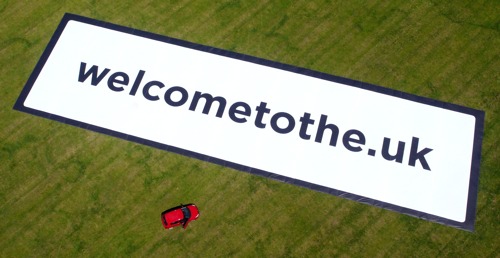Blog posts tagged domain names
Stephen Fry leads the way with a new .uk domain

From today, new, short .uk domain names are available alongside the well-established and recognised .co.uk. This means you can buy www.yourwebsite.uk as well as (or instead of) www.yourwebsite.co.uk.
According to the UK's domain name registry, Nominet, the first person to switch from .com to .uk is British icon and tech enthusiast Stephen Fry. Well, he does own five smart phones, for goodness' sake.
Nominet is also rolling out what it claims to be 'the world's largest welcome sign' (pictured), on the approach to Heathrow Airport. Weather-permitting, it's visible from 35,000 feet, so plenty of travellers should see it.
Is .uk a good idea?
But amidst these celebrations, what does .uk mean for businesses in the UK? For that matter, what does it mean for UK internet users as a whole?
Well, Nominet argues that .uk domains are 'more succinct' and comparable with the likes of .de (Germany) and .fr (France).
According to its research, when presented with a series of new domains, such as .company or .london, sites ending in .uk remain the first choice for 93% of British users.
But since proposals for .uk were first floated, they've come in for a fair bit of criticism.
Detractors say businesses with existing .co.uk domains will face increased costs, because they'll feel obliged to register the equivalent .uk domain too.
And could having both .co.uk and .uk domains increase consumer confusion?
Eleanor Bradley, chief operating officer of Nominet, reckons .uk is a no-brainer for such a digitally literate population: "The new .uk is for people who want a short, memorable domain with the popular and trusted .uk ending. We know this combination appeals to our tech-savvy, digitally-engaged population."
Your .uk domain is reserved
If your business owns an existing .co.uk domain name, you get first refusal on the equivalent .uk domain. You can exercise this right at any time in the next five years.
Nominet will be contacting these businesses to ensure they're aware of this opportunity.
This means if you own yourwebsite.co.uk, nobody else can register yourwebsite.uk until after 10 June 2019. So if you're unconvinced about the prospects of .uk, you can wait a few years before deciding whether to register it.
On the other hand, if you like to embrace new things and you're in the market for a domain name, you can register .uk domains from 8am this morning.
The first sites using .uk — including stephenfry.uk — should go live during the day.
Difficult domain name choices
In many ways, .uk seems like a very British domain name launch. While truly different domain names like .beer, .investments, .cash and even .rip have been grabbing the headlines, we've launched one that's a whole three characters different to .co.uk.
Will that be enough to catch on alongside established standards like .co.uk and .com, and against a background of more adventurous alternatives?
Only time will tell. But if they've managed to get Stephen Fry onside, this new domain has got to be in with a chance.
You can register .uk domains through domain name registrars like 123-reg, 1&1 and Names.co.uk from 8am today.
Are you about to buy a dumb domain?
 With thousands of new domain name extensions becoming available, choosing a domain for your business seems to have got both easier and more difficult.
With thousands of new domain name extensions becoming available, choosing a domain for your business seems to have got both easier and more difficult.
On one hand, there’s more choice. You can avoid having to scrabble around for an available .co.uk or .com domain by simply opting for one of the new extensions. Maybe you’d like www.yourbusiness.food or .music.
But on the flipside, nobody really knows which — if any — of these domain names are going to be successful or desirable.
For instance, will some domain extensions get targeted by spammers and scammers? If so, you probably won’t want to be associated with them.
In the past, we’ve been somewhat sceptical of these new domains. With so many to choose from, it seems inevitable some will sink without trace. Perhaps not .London (it made the front page of the Evening Standard, after all). But can you see .guru, .vip and .rehab all catching on?
Now there’s a website, Dumb Domains, designed to showcase some of the more unconventional domain options available.
It’ll show you one available domain at a time. But you won’t have to reload many times before you see a silly one.
For instance, although www.pirate.lighting sounds pretty cool, we’re not so sold on butt.construction or sploosh.computer. (Both are available for $28.99, if you fancy taking a punt.)
Would you pay more for a secure. UK domain name?
 Nominet, the organisation that administers all domain names ending in .uk, has announced a proposal to create a new, shorter UK domain name extension. Quite simply, you could have www.yourbusiness.uk.
Nominet, the organisation that administers all domain names ending in .uk, has announced a proposal to create a new, shorter UK domain name extension. Quite simply, you could have www.yourbusiness.uk.
According to Nominet, the new extension would appeal to businesses looking for a shorter domain name.
They're right: a .uk domain name will be exactly three characters shorter than the equivalent .co.uk domain name. That'll save heaps of time.
A new level of security
But that's not the end of the story. Nominet also thinks these domain names could become regarded as trustworthy and secure, because they'll be taking some extra security precautions:
- UK-only registrations. You'd have to prove you have a UK address before being allowed to register one of these new domains.
- Malware scanning. All websites with the new domain name would be scanned daily to check they're not infected by malware.
- Digital signatures. Domains would be digitally signed, to reduce domain hijacking, where someone steals your domain name.
These security elements would be combined under a 'trustmark' to reassure internet users.
In its FAQ about the proposals, Nominet reckons this new type of domain name could appeal to smaller companies:
"In particular, it could also encourage small to medium sized enterprises to take up an online presence."
But eagle-eyed readers will spot that these domains would cost significantly more than existing .co.uk domains. The wholesale price of each domain is expected to be up to £20 a year.
That's steep - a .co.uk domain costs £5 for two years. (Businesses typically pay more than the wholesale price, because domain name companies add a markup.)
A solution looking for a problem
At face value, the security argument looks a little flimsy. There's not much evidence to suggest internet users have big worries about the trustworthiness of existing UK domain names.
Nothing wrong with a belt-and-braces approach, of course, but McAfee's Mapping the Mal Web IV (PDF) research - admittedly a couple of years old - rated existing UK domains as low risk. It scanned just under 900,000 and found problems with less then 1%.
Nominet's own A Great Place to Be website even talks up the advantages of .co.uk domain names for business.
Inevitably, some will say the new domains are nothing more than a money-making scheme. Surely any business that already has a .co.uk domain will want to grab the .uk equivalent, if only to stop anybody else using it. That could get expensive for companies with several domain names.
What do you think? Would you pay extra for a slightly shorter domain name that's regularly scanned for problems? Would it make any difference at all to your company?
- Learn more about the proposals and give your views on the Nominet website
Companies offering UK domain name registration: |
Image of bunting: Dave_S. on Flickr
.co domain names: not just a load of hype?

Just over two years ago, it became easy for anyone to register and own a domain name ending in .co. This meant you could have www.yourbusiness.co as your website address.
The .co mascot appears to be a flying pig (see image), which seemed suitable - because at the time, we were we were sceptical. Who'd want a .co domain name? It just looks like you've missed the .uk off the end of it.
A couple of years later, I'm starting to wonder if we called it wrong. Seeing a .co domain name on a business card or sign still looks weird to me, but the fact I've been noticing them 'in the wild' at all suggests they are gaining in popularity.
Is .co more recognisable?
Of course, the more companies that use them, the more recognisable .co domain names will become. That means even more businesses will starting using them, which means ... well, it means that if you have your eyes on a good .co domain name, you might want to grab it sooner rather than later.
Aside from Joan Rivers - whose website, joan.co, is proudly cited by the official .co registry - I've noticed a few small businesses using .co domains in the last few weeks:
- The Gardener's Cottage, a small restaurant in Edinburgh at www.thegardenerscottage.co
- Food for Thought, a London catering firm that has snaffled www.foodforthought.co
- Decoded, a firm offering a one-day computing coding workshop via www.decoded.co
- XOXO, a too-cool-for-school London bar you'll find at www.xoxolondon.co
Sure - it's still early days for .co domains, and they're a long way off from becoming mainstream. But I just wonder: if these pioneering companies do mark the start of the trend, now would be the right time to grab a decent .co domain name for your new business, or for that business idea you'd like to get off the ground one day.
How to register a .co domain
Most domain name registration companies offer .co domain names, although prices can vary quite a lot. Here are some of the best options out there at the moment:
- 123-reg has .co domain names at £14.99 for the first year, rising to £29.99 for subsequent years.
- GoDaddy has .co domains at £18.89 a year, with £10 off for the first year.
- Easily has .co domains for £24.99 a year.
- 1and1 has .co domains for £29.99 a year.
As with most other domain names, you must buy your domain for a minimum of a year. You can then choose to renew if you want to. If you buy a domain with any of the companies listed above then it should be relatively straightforward to use it however you wish in future: to set up a website, for email addresses, and so on.
What do you think of .co domains? Are they a worthwhile investment, or a waste of money?
Coming soon: dodgy domains and useless URLs
 Good grief. The world of domain names looks like it’s about to become much more confusing.
Good grief. The world of domain names looks like it’s about to become much more confusing.
You might remember that about a year ago, ICANN (the organisation that manages domain names around the world) decided that we needed some new domain name extensions to go along with .com, .co.uk and the like. It wanted to pave the way for domain names ending in things like .microsoft, .google, .web or .anythingatall.
Sounds confusing? That’s because it is. There’s already a bewildering array of domain names available out there, from .co and .biz to .info and .xxx. You rarely see companies using them because most businesses realise that a .com or .co.uk is their best bet.
Sure, it’s irritating that professional domain name traders have bought up lots of the best addresses. In fact, you could argue that’s played a part in creating false demand for new domain extensions.
But no matter. It’s happening. New domain extensions are coming soon. There have been over 1,900 applications for the things, mainly driven by big businesses who see a branding opportunity (.amazon, anyone?) and investors who see an opportunity to profit.
The full list of possible new extensions was released recently. Here are a few that caught my eye:
- .bbc. Our world-renowned British Broadcasting Corporation has applied for this one. After all, bbc.co.uk is such a tricky address to recall and type in a hurry.
- .porn, .sex, .sexy and .adult. Oh come on, it is the internet – you must have been expecting some adult-themed domains. But wasn’t .xxx supposed to be the definitive adult domain name?
- .cymru, .wales and .scot. If you run a business in Wales or Scotland, would one of these domains interest you? There are no domains proposed for England or Northern Ireland, as far as I can see.
- .rip and .vip. Two interesting target markets: dead people and people who think they’re more important than the rest of us. I can’t see us bothering with itdonut.rip, if I’m honest.
- .app. As mobile apps have become the thing in the last couple of years, is it any surprise that 13 different bidders are vying to run this domain extension? (Perhaps surprisingly, Apple doesn’t appear to be one of them.)
- .bentley, .boots, .guardian, .sky and .nextdirect. These are just some of the big UK brands which have decided they want to take a punt on their own domain extension. But is .nextdirect really any better than next.co.uk?
If you can be bothered then you too can review the whole list of proposed domains. Make sure you look out for my personal favourite: .transformers, which Hasbro has proposed. In fact, that’s maybe the only worthwhile one of the lot.
Shopping around for a new domain name?
Or looking for a web hosting company? You can buy domains and web hosting from: 123-reg; Daily Hosting; NamesCo; Easily; 1and1; JustHost; Heart Internet; Strato Hosting; eUK Host; UK2.net.
More content on domain names:
Domain names: a sexy business?
 You might have heard about the new adult industry orientated sponsored top-level domain names (sTLD).
You might have heard about the new adult industry orientated sponsored top-level domain names (sTLD).
These are domain names ending in .xxx, which were finally given approval in March this year.
As part of this, the domain registry managing the .xxx domain names, ICM Registry, is implementing a phased launch.
This will let those with intellectual property trademarks and existing domain names either secure their .xxx equivalent domain, or to block on their intellectual property being used as an .xxx domain.
The people over at ICM Registry have produced a pretty reasonable flow chart to guide you through the process. The key thing to note is that the sunrise period – during which you can apply to have domain names blocked – ends in just a couple of days, on 28 October.
What does this mean for you?
In essence it comes down to this:
If your business operates in the adult industry and you want a .xxx domain, you can register a .xxx domain matching one you already own right now (as a .com or .net etc). Manufacturers of adult products can register their trademarks too. This is known as Sunrise A, and this period ends on 28 October.
If, like most of us, you are not involved in the adult industry, then you are probably looking at Sunrise B. Here you can protect your domains and trademarks from becoming .xxx domains.
For example, a fictional Bob’s Widget Co making an aftermarket add-on product, Widget2000 with a site on the domain bobs-widgets.com, could secure bobs-widgets.xxx (their equivalent domain) and widget2000.xxx (a trademark) and this would prevent any other entity registering these as .xxx domains.
If you apply to have domains blocked in this way, the block lasts for ten years - and is non-refundable and non-reversible. Sunrise B runs in parallel with Sunrise A, so also ends on 28 October.
Blocking domain names sounds well and good, but there are a couple of things to watch for:
- Blocking a domain is not the same as registering one. Importantly, you can’t redirect visitors to your blocked .xxx domain name to your main website.
- The cost of a block is quite high. Depending on who you register for, it can cost over £100 a year. That’s a lot more than the cost of registering a .com domain for ten years.
Protecting your domain name
I think it needs to be said that protecting domain names shouldn't be a concern for local businesses.
Is someone really going to register your trademark as a domain name for up to £150 a year? Because this is what a full .xxx registrations appear to cost. Sony.xxx might be targeted by domain name squatters, but locallawfirm.xxx? I hardly think so.
Then there’s the question of whether .xxx domain names will last. With the adult entertainment industry’s trade association, the Free Speech Coalition, campaigning for a boycott of .xxx domain names, any domain registration or block could be a short-lived investment.
I guess the Free Speech Coalition is upset that a third party will profit by charging disproportionately high fees for .xxx domains.
And perhaps they have a point: the cost is magnified when a single company needs to register multiple domains. For instance, the adult site kink.com reportedly has about 10,000 domain names and simple maths shows it could cost them around £1.5M to secure their .xxx related domains. I don’t think that would be a profitable move for them - after all, they’re still likely to be kink.com instead of kink.xxx.
I hate to tell of impending doom, but I just can’t see mileage in this domain name extension.
Are you bothering to register any .xxx domain names for your business? Leave a comment and let us know.
This is a guest post from Phil Stott, who works for I-COM, a full-service online marketing firm. This post originally appeared on the I-COM blog.



